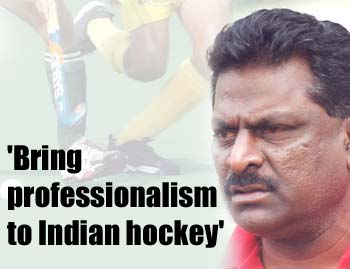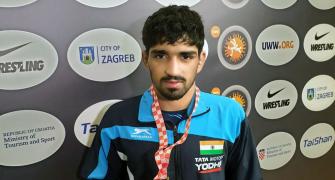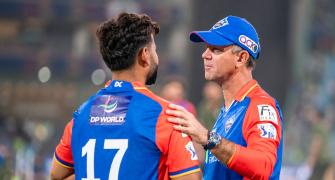
Vasudevan Bhaskaran, who led India to the last of its eight Olympic gold medals in hockey at Moscow in 1980, appeared totally disgusted with the country's sports culture when Shobha Warrier met him at his residence in Chennai late last week. He was of the opinion that lack of professionalism and transparency are plaguing the system.
Speaking in the wake of the sacking of the Indian hockey team's chief coach, Rajinder Singh, the Padma Shri recipient said a coach should be given at least four years with the team and full authority to run it.
Do you feel hockey coaches are not being treated properly by the Indian Hockey Federation? They are sacked in the middle of a tournament or just before a major one. How do you react to the recent episode in which Rajinder Singh was sacked when he and the team were in Germany?
I would say the first thing the government of India should do is bring professionalism to Indian hockey. We don't have professionalism in the selection of coaches, unlike other countries where they give a minimum span of four years to the coach, and during that period he has the full authority to run the team.
Here, in India, most of the coaches have become crisis coaches, and they have no idea how long they will continue with the job.
Is there no contract?
No, there is no contract system in India. My question is: why do they give contracts to foreigners alone? Why?
You mean Indian and foreign coaches are treated differently?
Yes. Why is it so? Even after 56 years of Independence we have separate rules for Indian and foreign coaches. If you don't want an Indian coach, don't appoint him. Take for example the same Rajinder who is sacked now. He had done well in the Junior World Cup [which India won in 2001]. So when somebody is doing well, and if he is a good coach, why should you change him?
A team consists of players, coaches and also administrators. If the team is not performing well why do you spare the administrators? They are also responsible if you apply the same yardstick. Why is it that ten coaches have been changed in the last ten years? Why have only the coaches been changed?
Is it not very humiliating to be treated like this when you are on foreign soil?
It is very humiliating, but we take all this in our stride. Memory is very short in India. We will talk about this issue for two or three days, and then forget about it.
But you cannot forget this issue [sacking of Rajinder Singh] because it happened just before the departure of the team for Athens. Earlier, the president of the IHF had said, 'I have faith in Rajinder Singh and he will continue up to the Olympics and, maybe, even later on too.' Sadly, with just a few weeks to go before Athens, and this has happened.
By this action not only the coach but the players might have felt humiliated, because it happened while they were in a foreign country. If it had happened in India it would have been different.
What has to change?
It is high time professionalism and transparency comes in. We should know why Rainder was sacked and what wrong did he do. This is a game that is played by 120 countries; it is as popular as football.
The problem is many people feel that India should always be winning the gold medal. I feel even if we are placed fifth or sixth it is a great thing.
If there is no transparency, there is no way this sport will improve.
In the four-nation tournament in Holland India did badly, but in Germany, it was only by sheer luck that Germany finished first. So, did the sacking of the chief coach surprise you?
I think it is like this: the IHF has observed that India fared well in Germany because the plan was made by the other three coaches. When the team did well, the other three coaches took the credit. Just three months ago, the same three coaches were assistants to the chief coach, and the team lost badly. That time the blame fell on the chief coach.
What is the meaning of all this? Why is the government keeping quiet? After all, hockey is patronized by the government, unlike with the BCCI [Board of Control for Cricket in India], which is independent and transparent. In the case of hockey the tax-payer's money is being spent. My question is: why not make them [the hockey federation] accountable? You call foreign coaches. Does anyone know how much they are paid?
The other day former India goalkeeper A B Subbiah [he was also former goalkeeping coach of the Indian team] said we should have foreign coaches as the game is fast changing in European countries...
The Netherlands is a champion side but they have a coach from Australia. The way the game is played fluctuates. Coaching becomes easier if you have skilful players.
My question is: how long are you going to keep a coach once he is appointed? Tell me, in the history of Indian hockey, how many coaches have survived four years? There is no long-term plan in anything.
For example, when a man is hired as the vice-president of a company for four years, in the contract it will be written that if he doesn't do what is expected of him in the first year or second year, his accountability will be questioned. Is this kind of professionalism there in the appointment of coaches? If you give a target from World Cup to World Cup, or Olympics to Olympics, the coach can chalk out plans.
Will the sacking of the chief coach at this juncture affect the morale of the team at the Olympics?
I really do not know. Maybe they [the players] are also on tenterhooks. They are also not sure about their position in the team. There's a rule saying that even one day before the tournament you can change a player.
Will that uncertainty affect their performance?
Definitely. In other teams, the chief coach will know the 13-14 players who will play in the Olympics at least one year before. There will be a choice only for the last two. That also happens two months before the tournament. So, he doesn't have to deviate from a plan. Here, four national coaches were changed. What does that mean? You have no plan; you were just playing.
How should the coaches be selected?
It is high time you streamline all this. Let them advertise in the papers that India needs coaches. The panel that selects the coaches should have well-known players from India on it, and not those who have nothing to do with the game. The IHF should not be there in the selection process at all.
Then the coaches should be asked to give a project. I know how it is done in other countries.
I feel this honorary business should go. If it is honorary, the performance also will be honorary. If it is a professional appointment, the performance also will be professional. Similarly, if the president, the secretary and other members of the association and selectors are paid, they will be accountable. In India people continue in their honorary position for 10 to 20 years without any accountability.
In the last ten years India has been improving and shining in many fields. I meet a lot of youngsters who are doing well. They are doing well because in the last five years they have been taught what professionalism is.
How did Infosys become such a huge company? Because it is run professionally. That is how sports also should be run.
What is your comment on not selecting Dhanraj Pillay initially?
The problem is here we do not have any selection committee, or any regular national championships. Tell me, how long are you going to continue with Pillay? It is not that I am suspecting his performance.
I personally feel a player should not be selected on the basis of his past performance however big he is. I want a person who can fit in the system, and who can help the team. I don't want a burden or a liability. If the player is a liability, he should change his thinking.
Why is it that Pillay is in some trouble or the other all the time? He is a chap who has had enormous publicity and also great games behind him. So he should be dealt with in a different angle. That is where the federation went wrong.
What are India's chances, not only in hockey but other events at the Athens Olympics?
You started thinking who will go to the Olympics in January or February of 2004. The Olympics got over in the September of 2000. In the last three years, nobody thought about the Olympics while other countries started planning from the day the previous Olympics got over. Do you know that in China they already have the second string players training for the 2008 Olympics?
You just see, after this Olympics too the media will cry out, like they have been doing all these years: 'why is it that we, a country of one billion, cannot produce a gold medal at the Olympics?'
Unless you get professional, unless you have long-term plans, you are not going to have any results. That is what is happening in India, sadly.








